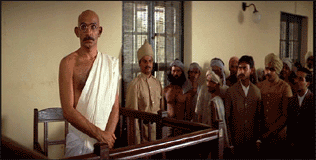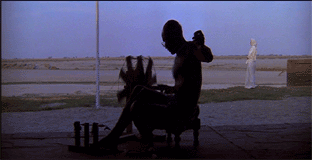|
Newest Reviews:
New Movies -
The Tunnel
V/H/S
The Tall Man
Mama Africa
Detention
Brake
Ted
Tomboy
Brownian Movement
Last Ride
[Rec]≥: Genesis
Hara-Kiri: Death of a Samurai
Indie Game: The Movie
Abraham Lincoln: Vampire Hunter
Old Movies -
Touki Bouki: The Journey of the Hyena
Drums Along the Mohawk
The Chase
The Heiress
Show
People
The Strange Affair of Uncle Harry
Pitfall
Driftwood
Miracle Mile
The Great Flamarion
Dark Habits
Archives -
Recap: 2000,
2001, 2002,
2003, 2004
, 2005, 2006,
2007 , 2008
, 2009 ,
2010 , 2011 ,
2012
All reviews alphabetically
All reviews by star rating
All reviews by release year
Masterpieces
Screening Log
Links
FAQ
E-mail me
HOME
| |
Gandhi (Richard Attenborough) 1982
 Gandhi has been bandied about so often as an example of the
Academyís tendency to give the Oscar to the safest, most important film that I
half expected it to be wholly mawkish and terrible. Itís really not nearly as
bad as I feared it might be. Although director Richard Attenborough has a
tendency to cut to a reaction shot of a child to demonstrate the emotion he
wants the audience to feel from time to time, those probably comprise less than
three minutes of the running time, which is over three hours long. Most of that
exceptional running time is spent rushing through over fifty years of Indian
political leader Gandhiís life, and itís somewhat surprising that the film
feels truncated when itís over. Gandhiís wife, for example, is a relatively
constant presence near the start of the film, but around the second hour she
disappears until near the filmís end, in which she is trotted out one scene
before she dies. Gandhi himself feels to get somewhat shorted, since the film
seems so worried that we wonít think of him as a Saint that it rarely endows
him or any characters that surround him with any sense of doubt. Also, the
British politicians that occupy India are almost cartoons in their
moustache-twirling evil simplicity. Shame on Attenborough, a Brit himself, for
indulging in the stereotype that says Englandís cultural pomposity is a mask
for shameless evil.
Gandhi has been bandied about so often as an example of the
Academyís tendency to give the Oscar to the safest, most important film that I
half expected it to be wholly mawkish and terrible. Itís really not nearly as
bad as I feared it might be. Although director Richard Attenborough has a
tendency to cut to a reaction shot of a child to demonstrate the emotion he
wants the audience to feel from time to time, those probably comprise less than
three minutes of the running time, which is over three hours long. Most of that
exceptional running time is spent rushing through over fifty years of Indian
political leader Gandhiís life, and itís somewhat surprising that the film
feels truncated when itís over. Gandhiís wife, for example, is a relatively
constant presence near the start of the film, but around the second hour she
disappears until near the filmís end, in which she is trotted out one scene
before she dies. Gandhi himself feels to get somewhat shorted, since the film
seems so worried that we wonít think of him as a Saint that it rarely endows
him or any characters that surround him with any sense of doubt. Also, the
British politicians that occupy India are almost cartoons in their
moustache-twirling evil simplicity. Shame on Attenborough, a Brit himself, for
indulging in the stereotype that says Englandís cultural pomposity is a mask
for shameless evil.
 These grumbles might sound like huge complaints to levy
against a film, but they actually donít have that much impact on the viewing
experience. The film is an abbreviated chronicle of Gandhiís exploits, almost
like his greatest hits collection, and as a result we donít really mind that
it doesnít cover things in depth, since itís shooting for a good deal of
breadth. The politics that are in the film are conveyed with a relative
simplicity, and I wish there were more scenes of self-doubt among Gandhi or his
followers, like the one in which Gandhiís wife refuses to clean a toilet.
Still, the streamlined approach to political content keeps us from getting so
caught up in it that we canít appreciate the filmís visual pleasures, such
as Indiaís well-photographed beauty or the sheer sense of scale in many of the
crowd scenes. The film has immaculate production values, and itís no surprise
that it swept the Academy Awards. Many have complained that the Best Picture
Oscar that year should have gone to the more populist E.T.
or Tootsie, but I think the choice in Gandhi
is a solid one, as itís a better picture than either of those (though
Costa-Gavrasí Missing is probably my favorite of 1982ís nominated films). Though
Gandhi is hardly a perfect film, its
failures at least tend to be relatively noble ones. The pacing of the film is
excellent, and it has an immediacy that belies its length. Ben Kingsleyís
performance as Gandhi is both excellent and charismatic, and he disappears
completely into the role once he shaves his head. It rarely feels like the stunt
performance that it is, though credit must be given to the excellent makeup that
physically transforms him. Overall, the filmís status of ďBest PictureĒ is
nothing for the Academy to be ashamed of, as there are far worse historical
epics (e.g. Braveheart) with which Gandhi
shares that title.
These grumbles might sound like huge complaints to levy
against a film, but they actually donít have that much impact on the viewing
experience. The film is an abbreviated chronicle of Gandhiís exploits, almost
like his greatest hits collection, and as a result we donít really mind that
it doesnít cover things in depth, since itís shooting for a good deal of
breadth. The politics that are in the film are conveyed with a relative
simplicity, and I wish there were more scenes of self-doubt among Gandhi or his
followers, like the one in which Gandhiís wife refuses to clean a toilet.
Still, the streamlined approach to political content keeps us from getting so
caught up in it that we canít appreciate the filmís visual pleasures, such
as Indiaís well-photographed beauty or the sheer sense of scale in many of the
crowd scenes. The film has immaculate production values, and itís no surprise
that it swept the Academy Awards. Many have complained that the Best Picture
Oscar that year should have gone to the more populist E.T.
or Tootsie, but I think the choice in Gandhi
is a solid one, as itís a better picture than either of those (though
Costa-Gavrasí Missing is probably my favorite of 1982ís nominated films). Though
Gandhi is hardly a perfect film, its
failures at least tend to be relatively noble ones. The pacing of the film is
excellent, and it has an immediacy that belies its length. Ben Kingsleyís
performance as Gandhi is both excellent and charismatic, and he disappears
completely into the role once he shaves his head. It rarely feels like the stunt
performance that it is, though credit must be given to the excellent makeup that
physically transforms him. Overall, the filmís status of ďBest PictureĒ is
nothing for the Academy to be ashamed of, as there are far worse historical
epics (e.g. Braveheart) with which Gandhi
shares that title.
* * * 1/2
11-29-01
Jeremy Heilman
|